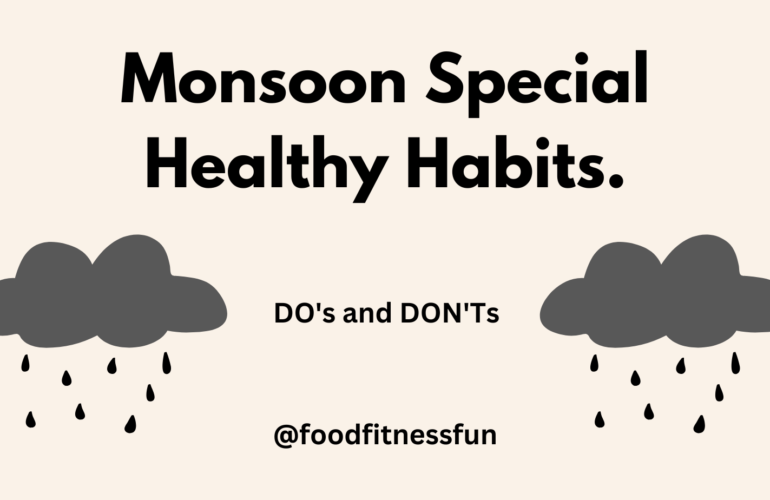“Embracing Scientifically Backed Practices for a Healthier Season”
As the monsoon season arrives, our dietary and lifestyle habits need to adapt to the changes in weather to maintain good health. This article explores some scientifically proven eating habits and lifestyle choices that can help you navigate the monsoon with ease and stay in the pink of health.
Eat freshly cooked meals, and consume barley, oats, and channa.

Scientific Basis: During the monsoon, the humidity and moisture in the air can lead to bacterial and fungal growth on food items, increasing the risk of foodborne illnesses. Consuming freshly cooked meals reduces the chances of consuming contaminated food. Barley, oats, and channa (chickpeas) are rich sources of dietary fiber, vitamins, and minerals, helping to boost immunity and maintain digestive health, which is crucial during the monsoon.
Consume ginger and rock salt to boost digestion.

Scientific Basis: The monsoon season is known for causing sluggish digestion due to the increase in humidity and atmospheric pressure. Ginger contains bioactive compounds like gingerol that aid digestion by promoting the secretion of digestive enzymes. Additionally, rock salt (sendha namak) is a healthier alternative to regular table salt as it helps improve digestion and prevents water retention in the body.
Consume warm drinks (limit caffeinated drinks), and avoid cold beverages.

Scientific Basis: Warm drinks, like herbal teas and soups, help to keep the body’s internal temperature stable and ward off cold-related ailments. Moreover, caffeinated drinks can lead to dehydration, which is a common problem during the monsoon. It is best to limit the intake of caffeinated beverages and opt for warm, non-caffeinated alternatives. Additionally, cold beverages can lead to a temperature shock in the body, making it more susceptible to infections.
Exercise regularly (don’t overdo it).

Scientific Basis: Regular exercise is essential for maintaining a healthy immune system and overall well-being. Engaging in moderate physical activity during the monsoon can help boost immunity and enhance metabolism. However, excessive exercise can lead to increased susceptibility to infections due to the body’s stress response. Finding the right balance and not overdoing the exercise routine is crucial during this season.
Keep feet dry.

Scientific Basis: Monsoon often brings puddles and dampness, which can lead to fungal infections, particularly in the feet. Fungi thrive in moist environments, and wet feet can make you susceptible to conditions like athlete’s foot. Keeping your feet dry and clean is essential to prevent such infections and maintain good foot hygiene during the monsoon.
Embracing these scientifically-backed monsoon-special eating habits and lifestyle choices can significantly contribute to your well-being during the rainy season. By consuming freshly cooked meals, incorporating digestive aids like ginger and rock salt, opting for warm drinks, exercising in moderation, and keeping your feet dry, you can enjoy the monsoon without compromising your health. Remember to prioritize immunity and digestive health to stay healthy and enjoy the beauty of the season.
